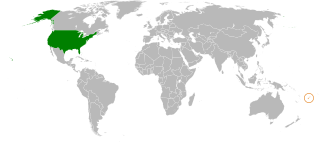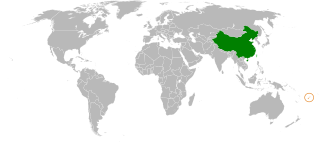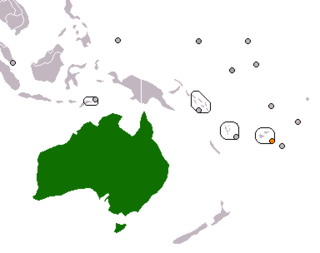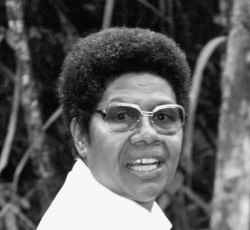
Josaia Voreqe "Frank" Bainimarama is a Fijian politician and former naval officer who served as the prime minister of Fiji from 2007 until 2022. A member of the FijiFirst party, which he founded in 2014, he began his career as an officer in the Fijian navy and commander of the Fijian military. Despite being suspended from Parliament, he served as the opposition leader from 24 December 2022 until 8 March 2023, when he resigned and was replaced by Inia Seruiratu.

In the early 2000s, Prime Minister Laisenia Qarase's government proposed legislation to establish a Commission with the power, subject to presidential approval, to pardon perpetrators and compensate victims of the coup d'état against the elected government of Mahendra Chaudhry in 2000. Most Fijian politicians outside of the government came out against proposed legislation Along with many politicians, the Military and a number of business and professional organizations also came out against the bill. The campaign derived its name from the yellow ribbons promoted by the opposition United Peoples Party and worn by many citizens, as a sign of their opposition to the legislation.
United Nations Security Council Resolution 1325 (S/RES/1325), on women, peace, and security, was adopted unanimously by the UN Security Council on 31 October 2000, after recalling resolutions 1261 (1999), 1265 (1999), 1296 (2000), and 1314 (2000). The resolution acknowledged the disproportionate and unique impact of armed conflict on women and girls. It calls for the adoption of a gender perspective to consider the special needs of women and girls during conflict, repatriation and resettlement, rehabilitation, reintegration, and post-conflict reconstruction.

The Reconciliation and Unity Commission was a proposed government body to be set up if the Reconciliation, Tolerance, and Unity Bill, which was introduced into the Fijian Parliament on 4 May 2005 was passed. The legislation proposed to empower the commission to grant amnesty to perpetrators of the Fiji coup of 2000, and compensation to victims of it from 19 May 2000 through 15 March 2001. The Fijian President would retain a veto over the granting of amnesty.
AdiSenimili Dyer is a former Fijian politician, who served as an Assistant Minister for Women and Culture in the Prime Minister's Office in the interim Cabinet formed by Laisenia Qarase in the wake of the Fiji coup of 2000. She held office until an elected government took power in September 2001.

The Fijian coup d'état of December 2006 was a coup d'état in Fiji carried out by Commodore Frank Bainimarama, Commander of the Republic of Fiji Military Forces (RFMF), against Prime Minister Laisenia Qarase and President Josefa Iloilo. It was the culmination of a political crisis that started the previous year, when the Qarase government introduced three bills to the Fijian Parliament. The Qoliqoli, Land Tribunal, and Reconciliation, Tolerance, and Unity Bills dealt with the ongoing ethnic conflicts in Fiji and the aftermath of the 2000 coup, and were considered to be pro-ethnic Fijian. Bainimarama presented the government with a list of demands on October 16 that included withdrawing the bills. Attempts at negotiation failed and the military launched the coup on 4 December. Parliament was dissolved, Qarase and his cabinet were dismissed, and some civilian officials were placed under house arrest. After the Great Council of Chiefs refused to appoint a cabinet friendly to the military, Bainimarama reached an understanding with Iloilo and reinstated him as President on 4 January 2007. Iloilo then appointed Bainimarama acting Prime Minister in charge of the Interim Cabinet.

Shaista Shameem, a Fijian lawyer, the director of the Fiji Human Rights Commission (FHRC) from 2002 to 2007, and its director and chairperson from 2007 to 2009. A graduate of the University of the South Pacific, she holds a PhD in sociology from the University of Waikato and a Masters in Law from the University of Auckland. She also holds a Doctorate in Juridical Science.
The Fiji Human Rights Commission (FHRC) was created by presidential decree in 2009, succeeding the entity of the same name established as an independent statutory body under the 1997 Constitution of the Republic of the Fiji Islands.
The People's Charter for Change, Peace and Progress was a proposed legal document which would have complemented the 1997 Constitution of Fiji. It would have established compulsory guidelines for any government policy in Fiji over the coming years. The People's Charter was due to be completed and come into force prior to the scheduled 2014 general election.

Fiji–United States relations are the bilateral relations between the Fiji and the United States. The relationship has improved significantly since Fiji's elections in September 2014, which restored a democratically elected government to Fiji for the first time since 2006. The United States had opposed Fiji's unelected government, which came to power through a military coup in December 2006.
Fiji established its Permanent Mission to the United Nations on 13 October 1970, three days after obtaining its independence from the United Kingdom. Since then, Fiji's participation in the United Nations has been notable primarily for its active role in UN peacekeeping operations, which began in 1978.

The Republic of the Fiji Islands was the first Pacific Island country to establish diplomatic relations with the People's Republic of China, in 1975. China established an embassy in Fiji in 1976, and Fiji opened its embassy in China in 2001.

Bilateral relations exist between Australia and Fiji. Both countries have a High Commission in the other.
Violence against women in Fiji is recognised to be "pervasive, widespread and a serious national issue" in the Pacific Island region. Fiji's rates of violence against women are "among the very highest in the world". The Fiji Women's Crisis Centre reports that 64% of women who have been in intimate relationships have experienced physical or sexual violence from their partner, including 61% who were physically attacked and 34% who were sexually abused.

Alaa Murabit M.D. is a Libyan-Canadian physician who has been serving as director of global health advocacy and communications at the Bill & Melinda Gates Foundation.
N-Peace, or ‘Engage for Equality, Access, Community and Empowerment’ is a UNDP flagship initiative founded in 2010 to commemorate a decade of UNSCR 1325 implementation via the Women, Peace and Security (WPS) agenda.
The Fiji Women's Rights Movement (FWRM) is a multi-ethnic and multi-cultural organisation based in Suva, Fiji, that works to remove discrimination against women through attitudinal changes and institutional reforms. FWRM believes in the practice and promotion of feminism, democracy, good governance and human rights. FWRM is known for its public opposition to military rule in Fiji since the first coup in 1987, and for its innovative approaches and core programmes related to intergenerational women's leadership in Fiji, particularly young, indigenous and locally-born women.
The U.S. National Action Plan on Women, Peace, and Security was adopted when President Barack Obama signed an executive order on December 19, 2011, 11 years after the United Nations Security Council adopted United Nations Security Council Resolution 1325 on women, peace, and security. It specified initiatives and activities that will empower and enlist women and girls in efforts to achieve international peace and security. The U.S. NAP was formally revised in June 2016. On June 11, 2019, the White House released the U.S. Strategy on Women, Peace, and Security, which superseded the National Action Plan.

Amelia Rokotuivuna was a Fijian socialist and feminist community leader and activist, who was known for her opposition to French nuclear tests in the Pacific and to the Fijian military coups in 1987 and 2000.
Kavita Naidu is a Fijian international human rights lawyer known for her work on climate change, refugee and criminal law.









